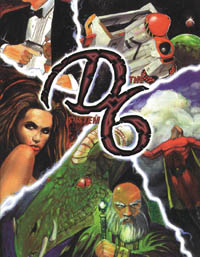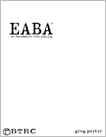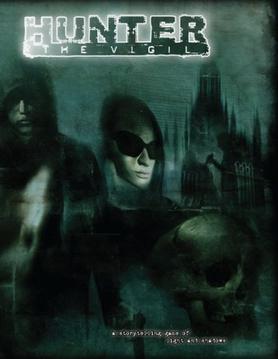
The Generic Universal RolePlaying System, or GURPS, is a tabletop role-playing game system designed to allow for play in any game setting. It was created by Steve Jackson Games and first published in 1986 at a time when most such systems were story- or genre-specific.
A storytelling game is a game where multiple players collaborate on telling a spontaneous story. Usually, each player takes care of one or more characters in the developing story. Some games in the tradition of role-playing games require one participant to take the roles of the various supporting characters, as well as introducing non-character forces, but other systems dispense with this figure and distribute this function among all players.

Wraith: The Oblivion is a tabletop role-playing game designed by Mark Rein·Hagen. It is set in the afterlife of White Wolf Publishing's classic World of Darkness setting, in which the players take on characters who are recently dead and are now ghosts.

Adventure! is a pulp action role-playing game originally printed by White Wolf Game Studio, the third and last book in the Trinity Universe line of games. The game, printed in black and white on pulp-like sepia paper to resemble a period piece, was conceived as a one-book game line, and was never supported by official supplements. Despite having a vocal fanbase, the Trinity Universe line was discontinued shortly after the game's publication; a d20 system version was released in 2004, but quickly discontinued. In 2002, Adventure! won the Origins Award for Best Role-Playing Game of 2001. Onyx Path Publishing has recently acquired the rights to the Trinity Universe and has announced its intention to release a new edition of Adventure!

Alternity is a science fiction role-playing game (RPG) published by TSR in 1998. Following the acquisition of TSR by Wizards of the Coast, the game was discontinued in 2000 as part of a broader rationalisation of TSR's business holdings, but it retains a small and devoted fanbase. Parts of Alternity as well as TSR's classic Star Frontiers game have been incorporated into the d20 Modern game, especially the d20 Future setting. The first campaign setting for the Alternity game, the Star*Drive setting, was introduced in 1998.

Fuzion is a generic role-playing game system created by the collaboration of R. Talsorian Games and Hero Games. The rights to Fuzion are jointly held by Mike Pondsmith of R. Talsorian Games, along with Steve Peterson and Ray Greer of Hero Games. Fuzion is a combination of the Interlock System,, and the HERO system. Fuzion is an adaptable system which can be played in any genre and setting imaginable.

HoL is a role-playing game created by Dirt Merchant Games and produced by Black Dog Game Factory, a subsidiary of White Wolf which produced adult oriented RPGs. The HoL Core Rulebook was published in 1994, and was followed up by one other supplement Buttery Wholesomeness in 1995. Although HoL is playable, it was meant as a satire of RPGs. The pages of the books are written by hand, and the authors freely take stabs at other popular role-playing games, particularly Vampire: The Masquerade and Dungeons & Dragons, and those who play them.
In some role-playing game (RPG) systems, the dice pool is the number of dice that a player is allowed to roll when attempting to perform a certain action.

Savage Worlds is a role-playing game written by Shane Lacy Hensley and published by Pinnacle Entertainment Group. The game emphasizes speed of play and reduced preparation over realism or detail. The game received the 2003 Origin Gamers' Choice Award for best role-playing game.

Shatterzone is a space opera role-playing game by West End Games. The game went out of print in 1997 after the company went bankrupt. The game is now back in print, owned and published by Precis Intermedia.

The D6 System is a role-playing game system published by West End Games (WEG) and licensees. While the system is primarily intended for pen-and-paper role-playing games, variations of the system have also been used in live action role-playing games and miniature battle games. The system is named after the 6-sided die, which is used in every roll required by the system.

An attribute is a piece of data that describes to what extent a fictional character in a role-playing game possesses a specific natural, in-born characteristic common to all characters in the game. That piece of data is usually an abstract number or, in some cases, a set of dice. Some games use different terms to refer to an attribute, such as statistic, (primary) characteristic or ability. A number of role-playing games like Fate do not use attributes at all.

Unisystem is a generic role-playing game system produced by Eden Studios, Inc. It is used in All Flesh Must Be Eaten, the Buffyverse role-playing games, CJ Carella's WitchCraft, Conspiracy X , and several other games. Games designed using Unisystem have been nominated for, and won, Origins Awards.

Ghostbusters is a comedy role-playing game designed by Sandy Petersen, Lynn Willis and Greg Stafford and published by West End Games in 1986. It is based on the 1984 film Ghostbusters.

A statistic in role-playing games is a piece of data that represents a particular aspect of a fictional character. That piece of data is usually a (unitless) integer or, in some cases, a set of dice.

The End All Be All game system, commonly known as EABA and pronounced "ee-buh", is a role-playing game system from Blacksburg Tactical Research Center (BTRC). It is a generic gaming system designed to adapt to any imaginary gaming environment. It was created by Greg Porter in 2003. The game cites the Hero System, GURPS and Call of Cthulhu as influences in its development.

Hunter: The Vigil is a tabletop role-playing game originally published by White Wolf Publishing on August 14, 2008, and is the sixth game in their game series Chronicles of Darkness – a reboot of the World of Darkness series. Led by a storyteller, players take the roles of people who have learned of the existence of the supernatural, and fight back against monsters as groups of hunters.

Street Fighter: The Storytelling Game is a role-playing game based on the Street Fighter video game series. It uses most of the basic game mechanics from White Wolf's World of Darkness games. It was released in 1994 and contains most of the characters from Super Street Fighter II. The Storytelling Game is currently out of print, as are all games using the original Storytelling System.
Now most commonly referred to as "Cortex Classic," the Cortex System is a generic RPG system based on the Sovereign Stone role-playing game system,, and was developed by Margaret Weis Productions, Ltd for the Serenity Role Playing Game. It was subsequently used for their licensed Battlestar Galactica and Supernatural RPGs, and brought out as a stand-alone system in the Cortex System Role Playing Game book. Serenity, using the Cortex System, was the 2005 Origins Award Gamer's Choice Role Playing Game of the Year.
The Star Wars Roleplaying Game is a tabletop role-playing game set in the Star Wars universe, first published by Fantasy Flight Games in 2012. It consists of different standalone cross-compatible games where each one is a separate themed experience. The sourcebooks support games set from the Clone Wars era to the original Star Wars trilogy era; there is limited support for the Star Wars sequel trilogy era. Since 2020, the game line has been maintained by Asmodee's subsidiary Edge Studio.














